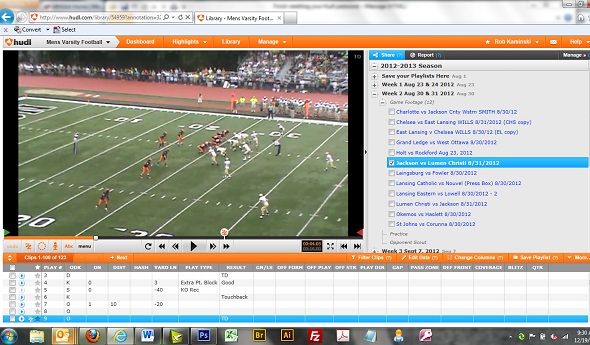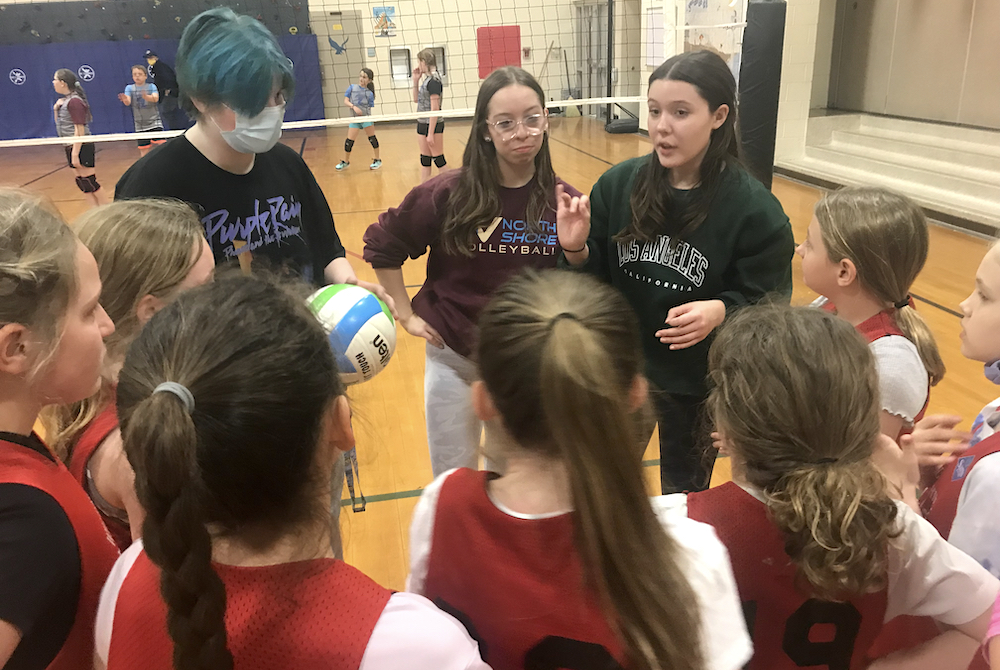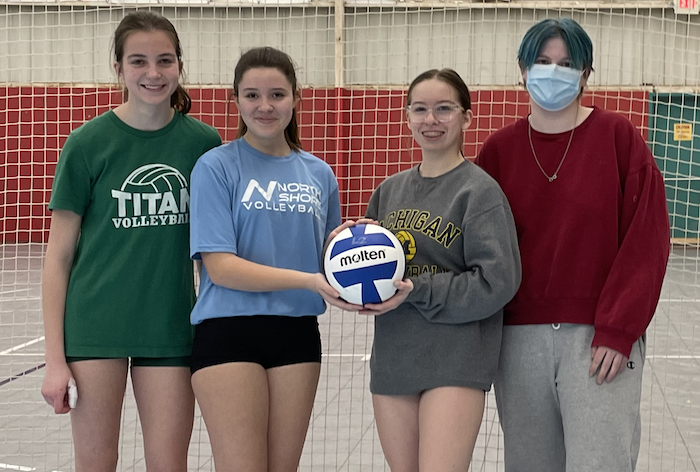
The Changing Face(book?) of Coaching
March 26, 2013
By Rob Kaminski
MHSAA benchmarks editor
From online video exchange programs such as hudl.com to social media platforms like Facebook, Twitter, and LinkedIn, the face of coaching and communicating with teams is ever-changing. How much is too much, and how are the new tools being used by the old guard?
With increasing frequency, today’s coaches are turning to technology to assist in their endeavors, particularly in video review and data compilation, as the number of programs available to them seems to grow on a daily basis.
Among the recent leaders, hudl.com seems to have won the favor of football coaches across the state, reducing video exchange and study to a couple clicks of the mouse.
Several members of the MHSAA Student Advisory Council report that their football coaches use the web-based program, and even local officials associations are using it for film study.
Similar programs are making it easier for today’s coaches to analyze data and compile statistics as well.
“The dispensing of information is much quicker than it used to be,” said Marshall bowling coach Sue Hutchings. “We use a scoring software for our stats.”
In more “visual” sports such as competitive cheer, online video is now essential.
“Video playback and feedback to athletes has helped the sport 10-fold,” said Middleville Thornapple-Kellogg coach Abby Kanitz.
In some cases, coaches are taking the lead on such initiatives.
“I run the MISCA (Michigan Interscholastic Swim Coaches Association) website and receive plenty of positive feedback about us posting meet results and top times reports,” said Bloomfield Hills Andover coach David Zulkiewski. “I also visit MHSAA.com weekly. Since I run the MISCA website, I want to make sure I have accurate and up-to-date information posted.”
Technology has also made the world a bit “greener” even in the small corner that is interscholastic athletics. From the required MHSAA rules meetings moving to an online format, to volumes of data now stored on flash drives rather than in file cabinets, coaches are realizing savings in both time and cost.
“The current state of track and field and cross country is so much more manageable than when I began,” said East Kentwood’s Dave Emeott. “I remember compiling actual papers from all over the state to keep track of the opposition, and now thanks to Athletic.net we have this access at the tip of our fingers. These programs have also replaced nights spent inputting data and record-keeping. I am sure I have replaced all that time elsewhere, but it is probably spent with kids and not with data.”
With the saturation and availability of these reports around the clock also comes temptation for those who are driven, and even obsessed, with such numbers. Coaches can rank near the top of that list.
“Technology can be extremely helpful and time-saving for coaches and teachers,” said Grand Haven wrestling coach James Richardson. “But, the disadvantage is the coaches and athletes have a more difficult time getting away from the sport, as we have access to so much information, and others have more access to us. This can lead to too much time being devoted to our sport.”
It also might even take some of the fun out of the actual competition.
“I think the one negative side of technology is the lack of the unknown,” Emeott said. “There was a day when we would enter a meet and not really know how the day would turn out. Now I have most meets scored within 10 points the day before we arrive.”
At times, such advance information also can lead to overconfidence heading into competition.
“Currently the MHSAA Final draw is posted online, and my players often see it and draw their own conclusions before I have a chance to talk to them about it,” said Allegan tennis coach Gary Ellis. “In the past, I was able to present their draw in the light in which I wanted them to see it.”
Another side effect is the indirect push to play beyond high school.
“There is a lot more social promotion and glamourizing of the athletes,” said Mike Van Antwerp, Holt lacrosse coach. “The recruiting pressure has increased tremendously, which is causing kids to commit earlier and go to great lengths to have a chance at being recruited.”
The world has indeed become a smaller, more familiar place. Not only can students and coaches learn pertinent statistics relating to any given opponent, they can also learn personal information about their competition through the deluge of social media vehicles.
It is in this realm where the greatest divide exists between coaches and their athletes when the subject of technology comes up.
Several members of the MHSAA Student Advisory Council indicate that their coaches do not use social media to assist with the daily activities involved with their sport, while others are but only on a limited basis.
It’s not that the coaches don’t know about Facebook, Twitter, LinkedIn, or the other platforms. More likely, they are all too well versed in the abuses of such mediums by young adults not yet ready to understand the lasting ramifications of a random tweet or damaging photo.
“We have specific rules for use of cell phones at practice, games, in the locker room, etc.,” said Diane Laffey, athletic director and coach at Warren Regina. “We also have a form for parents to sign if they want the coach to be able to text their daughter about practice or game cancellations or changes. We stress that the texting only be for necessary things, and the parents are to give permission.”
Safeguarding against the misuse of handheld devices is becoming as commonplace as handing out uniforms prior to the season.
“By rule, our players aren’t allowed to bring electronic devices to the court with them. We restrict cell phone usage at practice,” said Portage Central tennis coach Peter Militzer. “Players must ‘friend’ the coach on either Facebook or Twitter, and I monitor their activities to make sure their language and behavior meets our standards. We restricted a player’s opportunity to play on varsity last season due to excessive use of crude language and an offensive user name on Twitter.”
PHOTO: This is a screenshot from Hudl.com, an online service used by high school football coaches for video analysis and archiving.

Traverse City Athletes Taking LEAP into Coaching, Officiating
By
Tom Spencer
Special for MHSAA.com
March 18, 2022
Set. Spike. Jump – rather maybe leap?
 Nothing new to many female high school student-athletes.
Nothing new to many female high school student-athletes.
But this spring, Abigail Hicks, Keira Castle, Madeline Bildeaux and Honorae Shore made THE LEAP — as in Learning, Enrichment and Athletic Programs (LEAP). They actually leaped into coaching and officiating roles.
Hicks, Castle and Shore stepped into LEAP as coaches for Willow Hill Elementary School’s volleyball team. Bildeaux became a referee for LEAP’s 4th and 5th grade volleyball program.
All four girls are part of the North Shore traveling volleyball club. And, all four are a part of Future Coaches, its 4-year-old program preparing athletes to become effective coaches through LEAP, which is operated through Traverse City Area Public Schools.
Bildeaux and Castle played their first high school volleyball seasons last fall at Traverse City West. Hicks did the same at Traverse City St. Francis. Shore attends Greenspire, a Grand Valley State University-sponsored charter school located in Traverse City.
Parents, grandparents and school administrators love having the high school girls on the sidelines. The girls may love it even more though.
“The most rewarding aspect of teaching young girls is seeing the excitement they get when they get the hang of playing or when they win a game,” noted Castle, who started with the coaching program as an eighth grader. “I also love knowing that I've helped some of these girls fall in love with a sport.”
There may not be anyone more thrilled with the girls taking the leap than David Payne, elementary sports manager for LEAP. The student coaches help LEAP meet its vision of providing preschool through 12th-grade students with increased opportunities for engagement beyond the school day with activities to improve learning, health and wellness.
“The high school girls have a love and knowledge of the game that they share with the elementary kids,” Payne said. “Parents that were not comfortable or able to coach are finding the excitement and interaction between the high school girls and the elementary kids is very positive.
“At times the high school coaches look like cheerleaders on the sidelines,” he continued. “They keep the energy level high while supporting their team.”
The four ninth graders are the latest to make the “leap.” Jordan Bates, founder of the Future Coaches program, first connected the players as coaches with LEAP as COVD-19 shortened the 2020 season. The very first high school volleyball player to make the leap was Phoebe Humphrey, now a Traverse City Central sophomore. Humphrey coached Cherry Knoll as an eighth grader during the 2020 brief season. She is now coaching Eastern Elementary.
The pandemic also resulted in the cancellation of the 2021 elementary season. This season will conclude next week.
“The opportunities for these athletes to coach their own teams is extraordinary,” Bates said. “It would not have happened without David Payne.
 “His support, scheduling acumen, and love of sports has made this program pretty amazing.”
“His support, scheduling acumen, and love of sports has made this program pretty amazing.”
Veronika Caughran, who plays for Traverse City Central, is helping Cherry Knoll Elementary in Traverse City. Anissa Wille, Suttons Bay High School; Jenna Flick, TC West; and TC Central’s Natalie Bourdo and Lily Briggs have coached North Shore travel teams. Briggs, Bourdo and Humphrey have been coaching in North Shore’s beach program for the past three years.
Hicks, who recalls Gladiators varsity players helping coach her in volleyball as a fifth grader, said the girls can’t go it alone. She’s found the Willow Hill school community to be extremely supportive.
“We have received lots of positive feedback from parents, our coaches, our team, and other LEAP coaches,” she said. “All the parents have been very kind and grateful and always willing to support the team by bringing in snacks for after the game — not only for our players but for the opposing team — along with being willing to help line judge and run the scoreboard.”
The high school players-turning-coaches have been attending classes with Bates and guest coaches mostly from the North Shore club. Topics covered include coaching philosophy, how to be a great referee, practice planning, tournament preparation and health and wellness.
Bates said the program benefits go beyond the participants.
“Perhaps the biggest struggle is for athletes and parents to realize how valuable coaching is to an athlete,” he said. “It not only helps them with communication, structure, planning, and strategizing, but also it makes them better athletes earlier in their journey.”
Adding fun too is important, Hicks noted.
“I hope I help make practices a fun environment and for them not to worry about making mistakes and helping them know that not everything is their fault,” she said. “And … how to learn from their mistakes.”
Castle, who started playing volleyball as a fourth grader at Willow Hill, agreed. She recalls fondly the difference past coaches have made in her life, including Bates.
“While I've been coaching I've also noticed how (Willow Hill players) interact with each other and cheer each other on, and it's been such a great experience,” she said.
“I remember the feeling I felt when a coach made me love volleyball, and from coaching these girls I'm starting to see what that's like from a coaching point of view.”
Bates created the program with interscholastic competition and the student-athlete in mind.
“There is also the coaching shortage, so creating opportunities for these athletes to coach, and ref, just made sense,” Bates said.
Castle is preparing to meet the growing needs.
“I plan to continue coaching volleyball until the end of high school,” Castle said. “In a year or two, I want to start coaching middle school volleyball.
“When I get to college I plan to either continue coaching or find a job as a ref.”
Hicks indicated her experience has increased her love for the game of volleyball and respect for coaches.
“I learned that coaching is a little more complex than it looks, and you have to plan practice and be prepared for them to have a bad attitude or unfocused after a long day of school,” she said. “You, as the coach, have to have a good attitude, have lots of patience, be ready to problem solve and get them back on track.”
Teamwork, sportsmanship and the value of hard work are among the strengths Castle and the other future coaches bring to the table.
“We had our girls practice sportsmanship by saying ‘good game’ and waving to the other team,” Castle said. “In practice, we have taught them to work as a team and to always give it your all.”
Hicks recommends coaching to all high school athletes.
“I’ve learned a lot,” she said, “and this has been a positive, fun experience that I definitely recommend.”
 Tom Spencer is a longtime MHSAA-registered basketball and soccer official, and former softball and baseball official, and he also has coached in the northern Lower Peninsula area. He previously has written for the Saginaw News, Bay County Sports Page and Midland Daily News. He can be reached at [email protected] with story ideas for Manistee, Wexford, Missaukee, Roscommon, Ogemaw, Iosco, Alcona, Oscoda, Crawford, Kalkaska, Grand Traverse, Benzie, Leelanau, Antrim, Otsego, Montmorency, Alpena, Presque Isle, Cheboygan, Charlevoix and Emmet counties.
Tom Spencer is a longtime MHSAA-registered basketball and soccer official, and former softball and baseball official, and he also has coached in the northern Lower Peninsula area. He previously has written for the Saginaw News, Bay County Sports Page and Midland Daily News. He can be reached at [email protected] with story ideas for Manistee, Wexford, Missaukee, Roscommon, Ogemaw, Iosco, Alcona, Oscoda, Crawford, Kalkaska, Grand Traverse, Benzie, Leelanau, Antrim, Otsego, Montmorency, Alpena, Presque Isle, Cheboygan, Charlevoix and Emmet counties.
PHOTOS (Top) From left, Honorae Shore, Abigail Hicks and Kiera Castle coach their Willow Hill elementary volleyball team this season. (Middle) Madeline Bildeaux, far left, also has joined Castle, Hicks and Shore as part of the LEAP coaching and officiating program. (Top photo by Tom Spencer, middle photo courtesy of Allie Walters.)

